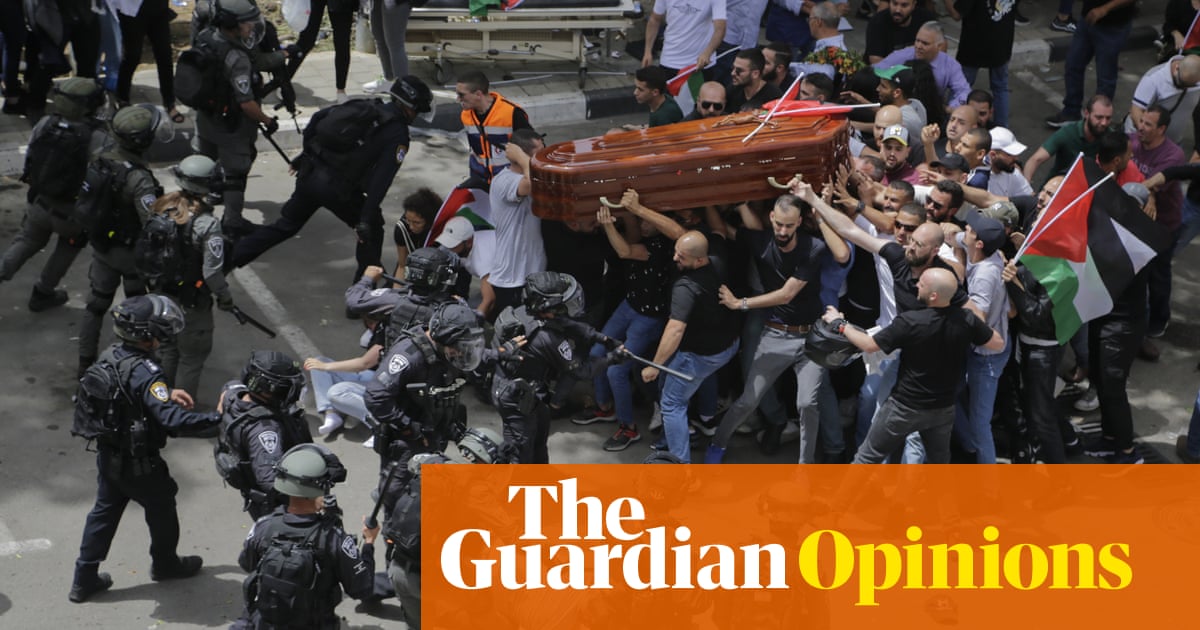
Show caption Israeli police confront mourners as they carry the coffin of journalist Shireen Abu Akleh in Jerusalem, 13 May 2022. Photograph: Maya Levin/AP Opinion Israel knows it will get away with the attack on Shireen Abu Aqleh’s funeral Elizabeth Tsurkov The violent scenes in Jerusalem are a symptom of a culture of impunity among the Israeli leadership and the police force it oversees Mon 16 May 2022 14.00 BST Share on Facebook
Share on Twitter
Share via Email
Many were shocked by the images of Israeli border police attacking the funeral procession of the prominent Palestinian journalist Shireen Abu Aqleh – not merely by the police’s cruelty, but also by their willingness to ride out the reputational damage from the attack. Abu Aqleh’s killing, likely by an Israeli sniper, the subsequent raid on her family home and the police’s intimidation of her brother prior to her funeral all point to the growing sense of impunity among Israel’s decision-makers and military.
Israel’s leadership had promised the Biden administration that the funeral of Abu Aqleh would be “respectful”. They are likely displeased with the viral videos showing policemen attempting to tear the Palestinian flags from Abu Aqleh’s coffin while beating pallbearers with clubs, causing her coffin to almost fall to the ground. Yet the country’s leadership has not faced any international repercussions for its actions in the occupied territories in years. In his meek statements concerning the assault on the funeral, the US secretary of state, Antony Blinken, described Israeli forces as “intruding into the funeral procession”, as if they were merely uninvited guests.
Israel can count on international inaction, while any steps to discipline the policemen or hold to account the sniper who shot Abu Aqleh, who was wearing a vest clearly indicating that she was a journalist, will open the government to attack from the Israeli right. For over a decade, the near-total disappearance of the Israeli left has meant that political competition of any consequence comes from within Israel’s rightwing bloc. Together with the growing strength of Israel’s far right (bolstered by former prime minister Benjamin Netanyahu), this has led mainstream politicians to move further to the right in order to avoid losing support among their base.
Israel’s prime minister, Naftali Bennett, and Netanyahu have tried at all costs to avoid appearing soft on the Israeli security forces, no matter their crimes. In 2016, after the Israeli soldier Elor Azaria was caught on camera killing an incapacitated Palestinian attacker in Hebron, Netanyahu initially condemned his actions. Later, after seeing poll results, he reversed his position and called for Azaria to be pardoned. Azaria ended up serving merely nine months in military prison. After his release, he became a major celebrity in rightwing circles. Policemen caught on camera beating journalists in Jerusalem, or soldiers involved in the detention of an elderly Palestinian-American man, who was bound, gagged and blindfolded, and who died shortly afterwards from an apparent heart attack, have not been tried.
These well-known cases of impunity are not an aberration. Data collected by the Israeli human rights NGO Yesh Din shows that only 0.7% of complaints filed by Palestinians against soldiers lead to prosecutions, while 80% of cases are closed without a criminal investigation. Israeli servicemen have no reason to expect they will face any repercussions for killing a journalist or attacking her funeral, broadcast live around the world.
Before Abu Aqleh’s funeral, the Israeli police warned her family to avoid the event turning into a protest, a clear attempt to demonstrate Israeli dominance. It’s not the first time the Israeli leadership and military have attempted to do this: earlier this year, the leadership allowed Jewish worshippers to ascend to the Temple Mount/ Haram al-Sharif and pray there, violating a previous agreement with the Jerusalem Islamic Waqf religious trust and Jordan.
In 2017, in another show of force, Israel installed metal detectors at the entrances to the al-Aqsa mosque. Mass riots led Israel to back down and remove them several weeks later. During the month of Ramadan, Israeli policemen prevented Palestinians from sitting near the Damascus Gate, a popular communal space, and carried out mass arrests of those who did. Recently, Shin Bet sent text messages to Palestinians whose phones were triangulated to the al-Aqsa mosque, threatening them with revenge for supposedly participating in riots.
The Israeli police’s violent attempts to remove Palestinian flags hoisted during Abu Aqleh’s funeral are merely the latest manifestation of a policy that aims to squash signs of Palestinian identity in Jersualem. In 2018, the Israeli government allocated 2 billion shekels (£480m) to “increase Israeli sovereignty over East Jerusalem”, with a focus on getting more schools to switch from teaching the Jordanian curriculum to the Israeli one. Israeli authorities forced the few schools in the city that still teach the Palestinian curriculum to censor textbooks discussing Palestinian history. Earlier this year, Israeli policemen arrested Palestinian students at Hebrew University in Jerusalem for singing what the police claimed were nationalistic Palestinian songs.
The killing of Abu Aqleh and the brutalisation of her mourners has surely caused Israel reputational damage. But unless international disapproval results in tangible political change, Israel’s leadership has no reason to stop other abuses in the future. Its leaders are focused on appeasing a rightwing base that demands nothing short of full-throated support to Israel’s security forces. As long as Israel’s allies continue to tolerate these abuses, impunity will remain the rule, not the exception.
Elizabeth Tsurkov is a research fellow at the Forum for Regional Thinking, an Israeli-Palestinian thinktank
Do you have an opinion on the issues raised in this article? If you would like to submit a letter of up to 300 words to be considered for publication, email it to us at [email protected]








